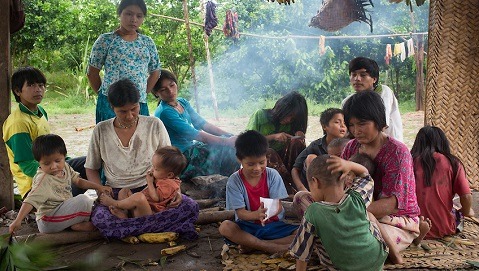Study indicates that indigenous leaders should be prioritized in decision-making and commitments on climate and environment worldwide.
Source: Servindi.
A new international report argues that ancestral and indigenous wisdom is extremely useful to address climate change compared to Western methodologies that have been applied.
The document called “Intangible Cultural Heritage Diverse Knowledge Systems, and Climate Change” was produced by an international team of twelve authors and five indigenous academics.
Some of the researchers are Victoria Reyes-García, from the Institute of Environmental Sciences and Technologies of the Autonomous University of Barcelona (UAB) and Neil Dawson, from the University of East Anglia (United Kingdom).
The initiative was co-sponsored by the Intergovernmental Panel on Climate Change (IPCC), the United Nations Educational, Scientific and Cultural Organization (Unesco) and the International Council on Monuments and Sites (ICOMOS).
The objective was to highlight the importance of culture in areas such as science and climate change policies.
The methodology was based on supporting the reason why knowledge from indigenous and local communities is a transforming and necessary factor in the face of Western interventions.
Although technologies or awareness campaigns by governments or private companies have been applied from a western side to combat climate change, they only encompass a very scientific understanding of the problem.
According to the document, the knowledge that the more than 400 million indigenous peoples of the world have provide alternative forms and knowledge that the traditional academy has not yet applied.
The latter is helpful in addressing issues such as climate change and biodiversity loss.
Knowledge systems include not only values, such as spiritual beliefs and connections to nature, but also ways of actively deciding, organizing and governing, managing and caring for land and resources.
They play a crucial role in the sustainable management of much of the world’s critical ecosystems, species and resources.
Despite the importance of the heritage that the communities possess, they are not respected and are even discriminated against and displaced from their territories.
Some examples included in the publication are the contributions of Mapuche spirituality to climate change mitigation in Chile, the practices and beliefs of the relocation of the peoples of Fiji, among others.
Also Bolivian indigenous practices in fire mitigation and water management applied in Sierra Nevada (Spain).
“Many international organizations now recommend that indigenous leaders and representatives play a much more prominent role and have more opportunities to influence decisions and commitments in global climate negotiations and climate strategies at the national level,” said Victoria Reyes- Garcia.
Knowledge systems also include ways of deciding, organizing, caring for the earth and its resources in the sustainable management of ecosystems and species, the report concludes.
At the local level, it recommends achieving more effective climate action by securing the rights of indigenous territories and supporting customary institutions.
National climate strategies and Nationally Determined Contributions (NDCs) should include customary governance and local administration as vehicles to achieve sustainable emission levels.
At the international level, the United Nations Framework Convention on Climate Change (UNFCCC) should elevate the role of the Local Communities and Indigenous Peoples Platform (LCIPP).
Likewise, facilitate a more direct allocation of resources to support the application and resilience of the various knowledge systems.
Additionally, IPCC assessment processes should include more indigenous scholars as authors or lead authors of the assessment, use broader forms of citation and case studies for the upcoming Assessment Round 7 and beyond.
It should include more evidence on the role of indigenous peoples and local communities through their traditional, but at the same time constantly evolving, systems.
Download study in English through the following link:
They ask to include indigenous knowledge in climate policies

